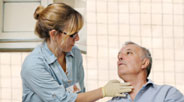A Speech-Language Pathologist (SLP) is a specialist who helps educate patients and their families about ways to minimize the effects of head and neck cancer and provides treatment when speech and swallowing skills become impaired.
Dysphagia, or difficulty swallowing, in one of the the major side effects of chemo and/or radiation treatment. Including a SLP in the initial treatment planning stage helps prevent/reduce dysphagia and improves quality of life. The biggest concern with dysphagia due to head and neck cancer is the increased of risk of aspiration. Aspiration is when food or liquid goes into the airway. This is often referred to as “going down the wrong pipe.” According to Lissette van der  Molen, et al, 2008, aspiration post treatment affects 23-78% of head and neck cancer patients under going treatment. John Holland, MD at OHSU, reported during a recent conference that oropharyngeal cancer is the most common type of head and neck cancer; currently at 32%. Speech Language Pathologists work closely with other medical professionals as part of the multi-disciplinary team to collaborate and develop the best plan of treatment. As part of the team, the SLP helps to establish a swallowing/nutritional baseline and implement such objective assessments as a swallow study should it become necessary. Following an evaluation, the therapist provides lots and lots of education about how the swallow works, problems that can occur because of the surgery and/or chemo radiation treatment, exercises that will improve the likelihood of a full recovery of the swallow post treatment and help establishing an oral hygiene program. Additionally, the SLP teaches exercises and develops a home program to decrease the risk of losing muscle function when swallowing becomes difficulty.
Molen, et al, 2008, aspiration post treatment affects 23-78% of head and neck cancer patients under going treatment. John Holland, MD at OHSU, reported during a recent conference that oropharyngeal cancer is the most common type of head and neck cancer; currently at 32%. Speech Language Pathologists work closely with other medical professionals as part of the multi-disciplinary team to collaborate and develop the best plan of treatment. As part of the team, the SLP helps to establish a swallowing/nutritional baseline and implement such objective assessments as a swallow study should it become necessary. Following an evaluation, the therapist provides lots and lots of education about how the swallow works, problems that can occur because of the surgery and/or chemo radiation treatment, exercises that will improve the likelihood of a full recovery of the swallow post treatment and help establishing an oral hygiene program. Additionally, the SLP teaches exercises and develops a home program to decrease the risk of losing muscle function when swallowing becomes difficulty.
Sometimes cancer involves the tongue, lips or jaw effecting the intelligibility of speech. Having to go through cancer treatment is bad enough, but having difficulty talking makes it so, so much worse. The SLP helps with assessing the problem and then coming up with techniques to improve communication. Sometimes an augmentative communication device is necessary. The speech pathologist will be able to navigate the system in order to obtain a device and then provide the required training.
